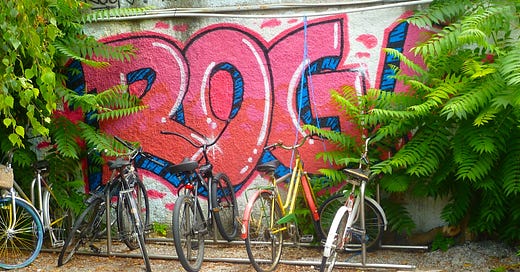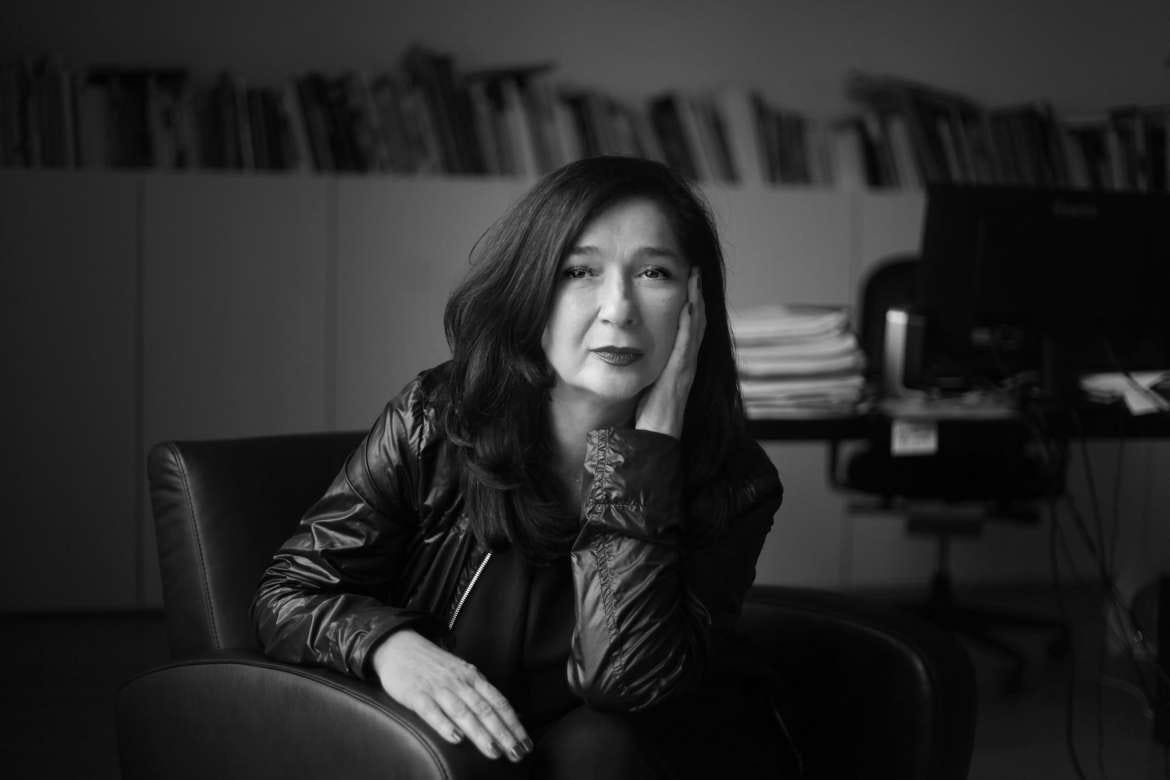XLII. Bicycle thieves
In Ljubljana, the Rog Autonomous Factory, home of the Slovenian alternative culture, was evicted. Meanwhile, independent institutions (or critical with the political establishment) are under pressure
Hi,
welcome back to BarBalkans, the Italian newsletter whose aim is to give a voice to the Western Balkans’ stories, on the 30th anniversary of the Yugoslav Wars.
This is not the post-World War II Rome and our protagonists do not hang posters around for a living.
However, we are still talking about Bicycle thieves.
In Ljubljana, Slovenia’s capital city, something has been stolen from popular neighborhood and something else risks ending up in the same way.
What are we talking about?
You will find out right now.
The manufacturing of dissent
Ljubljana, Tuesday 19 January, 7 in the morning.
In the triangle of land bordered by Trubarjeva, Petkovškovo and Rozmanova streets, the agents of a private security company - accompanied by police officers in riot gear - broke into the Rog Autonomous Factory.
Through an excessive use of violence (a dozen people were injured and 12 arrested, and many citizens gathered outside were sprayed with tear gas), the squatted factory was evicted.
All the material was seized.
In practice, they put an end to 15 years of experience of this social center.
A self-managed space, where migrants, circus performers and citizens on the margins of society found shelter.
The Rog Autonomous Factory was born in 2006 and kept the name of the old bicycle factory (Rog Bikes, active from 1951 to 1991). The site laid in a state of disrepair for 15 years, even if it was recognized as a monument of national heritage and bought by the city council in 2002.
Over the years, the autonomous social center has hosted self-managed spaces dedicated to art, music and sports, as well as to the support of refugees and vulnerable people, although lacking official permission.
There was a medical clinic for asylum seekers, a concert hall, a football pitch, the largest indoor skate park in the Western Balkans, a circus space, artist ateliers and galleries and a graffiti workshop.
The center was home to several organizations, such as Antifašistična Fronta (Antifascist Front), Nevidni delavci sveta (Invisible Workers of the World) and the Anarcho-Queer-Feminist collective.
«People who have not succumbed to the dictates of capitalist culture», Zana Fabjan Blažič, anthropologist and soul of the self-managed social center, explained. «People who have been able to make this city alive, active and worth living, despite the pressures from the police and the city administration».
Mayor Zoran Janković threatened to evict the squat in 2010, dissuaded only by the support of the local community and organizations. The last attempt was in 2016, on the 10th anniversary of the Rog Autonomous Factory foundation.
«The municipality of Ljubljana does not tolerate that we show how they prioritize profit over people and how they are turning the city into a Disneyland for tourists», Blažič added.
The attacks refer to the public administration’s plans on the redevelopment of the former bicycle factory.
In 2010, the city of Ljubljana participated in the project “A Second Chance: From Industrial Use to Creative Impulse”, joining the cities of Nuremberg (former AEG factory), Leipzig (HALLE 14 of the former Cotton Spinning Mill), Venice (the Arsenale) and Kraków (a tram depot).
The “Solidarity” project in Ljubljana aims to upgrade the former industrial site into the Rog Centre for Contemporary Arts, a 8,000-square-meter creative space that will be built within two years.
The Rog’s community has always fought against the gentrification of the capital city and the growing inequalities within Slovenian society.
«The social and educational programs that have enriched the city for years are swept away by arbitrary decisions and the alternative culture has lost a space of expression and life», The Left party accused:
«In Rog, everyone could find a place in the sun. Even people described as useless, unproductive, inappropriate, rejected by society, which is only focused on endless growth and immeasurable profits. Those in Ljubljana who are obsessed with megalomaniac projects - which hide the real social malaise behind renovated walls - have completely forgotten the people who were willing to offer selfless help. People who have been erased from society, literally and figuratively».
Restless voices
While the eviction of a squatted site may be a controversial issue, it is instead a fact that the Slovenian cultural field has faced an increasing pressure in recent months. Especially if it is independent or critical vis a vis the political establishment.
One of the most evident cases is the dismissal of Zdenka Badovinac, director of the Ljubljana Museum of Modern Art (December 24, 2020).
Badovinac has led the development of this cultural institution since 1993, turning it into one of the most progressive in the entire region and promoting new interpretations of the Yugoslav avant-garde in the 20th century.
This cultural development stepped on Janez Janša’s toes, the nationalist and conservative Slovenian prime minister (during his third term).
In an interview for Apollo magazine, the former director described her dismissal as «absolutely political», comparing the Slovenian government’s attempts to repress artistic expression with the scenarios playing out in Hungary and Poland:
«Along with the targeting of contemporary art, or any other cultural context that harbors social critique, we - meaning the artistic community - are seen as a threat».
Still in December, Badovinac was awarded the 2020 Igor Zabel Prize. The jury recognized the former director of Ljubljana Museum of Modern Art for her “outstanding contribution to Eastern Europe and global art history”.
Moreover, on November 17, a thousand cultural professionals and civil society actors in Slovenia addressed an open letter to the Minister of Culture, Vasko Simoniti:
«The field of culture has been severely affected by the Coronavirus pandemic and it has been further affected by the decisions of the Ministry of Culture, which threaten the living heritage, professionalism and autonomy of the decision-making bodies and cultural institutions».
They explicitly criticized the dismissal of both Badovinac and Matevz Celik, director of the Museum of Architecture and Design since 2010.
But there is more. All signers condemned the creation of new institutions, such as the Museum of Slovenian Independence: «A propaganda project, promoting a nationalist narrative», while all the other public culture budgets are being cut.
Another clear example of indirect pressure on alternative voices involves Radio Študent.
Radio Študent is one of Europe’s oldest and strongest non-commercial radio stations. It broadcasts music and information programs on subjects often ignored by other media, while training young journalists.
With more than 200 collaborators, this broadcaster livestreams for 17 hours a day and guarantees about 5,500 editorial contributions every year.
Nevertheless, “the publisher” - which is the Student Organisation of the University of Ljubljana (ŠOU) - on January 5 gave an ultimatum to the representatives of Radio Študent: to privatize or to rely on other resources.
The reason behind this choice was funding cuts. In other words, the student organization’s budget for 2021 did not include the co-financing of the independent radio station.
At a press conference on January 11, the director, Ana Kandare, and the editor-in-chief, Matjaž Zorec, sounded a warning:
«This is a political exploitation by the ŠOU, trying to prevent any chance of co-financing in the context of European projects. We are a burden to get rid of as soon as possible. So, we ask to what extent the interests of the student community are still represented by the ŠOU, since it is clearly disturbed by critical news and democratic opposition».
The “publisher” covers only 25% of Radio Študent’s budget. However, removing that specific quarter of the funds (120 thousand euros per year) puts the entire co-financing structure in serious danger.
On March 12, it was announced that Radio Študent has not lost the funding entirely, but 2021 budget will be cut by 30%, compared to 2020.
It means 40 thousand euros less. The total amount (84 thousand euros) will not be enough to make journalistic activities work properly, the broadcaster said.
For this reason, «the radio development plans will have to think of innovative survival strategies».
Threats to the independent cultural and journalistic field in Slovenia hang like a sword of Damocles.
However, the spirit of resistance seems anything but dormant.
Pit stop. Sittin’ at the BarBalkans
We have reached the end of this piece of road.
Today, we have to ask for something appropriate to this restless atmosphere.
Our trusted host serves some bottles of Ljubljana’s Tektonik craft brewery on our bar, the BarBalkans.
A brewery that takes extremely seriously its mission to establish a dialogue with farmers, select high quality raw materials and create a range of original recipes. Something that has nothing to do with industrial production.
A modern approach and cutting-edge technologies enabled to refine the mastery of English, Belgian and German beer practices.
From Hercule witbier to Wayne pale ale, from Nelson India black ale to Bergkönig’s Triger lager.
There is a world of craft beers ready to be cracked opened in Ljubljana, to the health of free and independent culture. Against all bicycle thieves.
Let’s continue the BarBalkans journey. We’ll meet again in a week, for the 43rd stop.
A big hug and have a good journey!
BarBalkans is a free weekly newsletter. Behind these contents there is a lot of work undertaken. If you want to help this project to improve, I kindly ask you to consider the possibility of donating. As a gift, every second Wednesday of the month you will receive a podcast with an article about the dissolution of Yugoslavia.
If you want a preview, just listen to BarBalkans - Podcast. You can find it on Spreaker and Spotify! Don’t miss the next episode on Wednesday!
As always, I thank you for getting this far with me. If you are interested in the figure of the Slovenian prime minister, I recommend you this previous newsletter (while here you can find all the others):
If you want to help me to make this experience grow, you can invite whoever you want to subscribe to the newsletter:
Pay attention! The first time you will receive the newsletter, it may go to spam, or to “Promotions Tab”, if you use Gmail. Just move it to “Inbox” and, on the top of the e-mail, flag the specific option to receive the next ones there.
BarBalkans is on Facebook and Instagram, while on Linktree you can find the updated archive.










